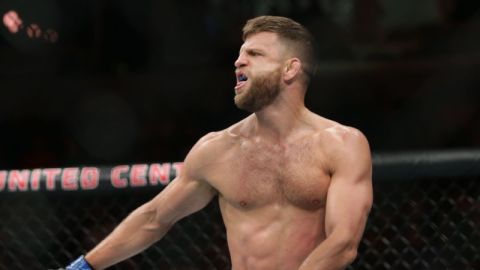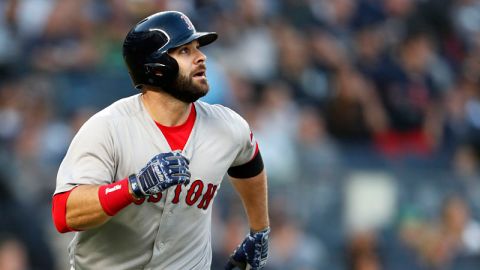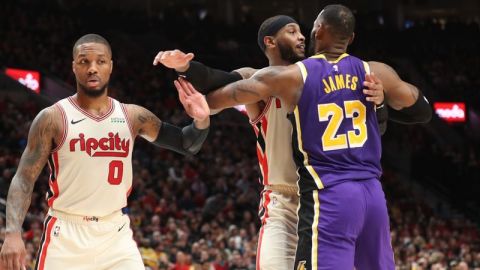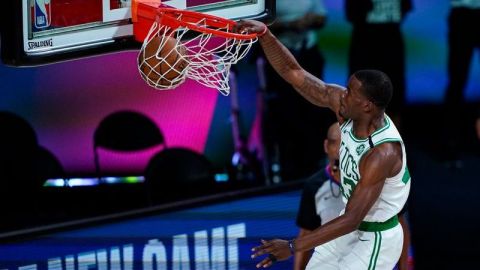While the NHL’s decision to let Matt Cooke skate free has now seemingly become a real problem for the league, the full implications of that lack of action may not be seen for some time. With the Penguins paying a visit to the Bruins on Thursday evening, let’s take a peek into the history books to see the ramifications other poor decisions have made in sports.
These decisions could be those of players, coaches, referees, officials, administrators, fans or anyone else. They aren’t necessarily bad calls by on-field officials (like, say, Diego Maradona‘s “Hand of God” goal, or the Jeffrey Maier non-interference call in Yankee Stadium, or any of the thousands of others). Instead, it’s a list of decisions that were made after the parties involved had time to sit and think about what they were doing.
As always, it’s difficult to narrow a century’s worth of history into a neat, 10-item list, so your suggestions are welcomed in the comments section.
10. The sucker punch that wasn’t
It seems only right that we should start with the Bruins.
The 2008-09 version of the B’s was a breath of fresh air for a city in which hockey was an afterthought after reigning supreme in years past. The team — which led the league in scoring, boasted the league’s best defenseman, head coach and goaltender — seemed destined to make a significant Stanley Cup run, but first Boston had to get through the Carolina Hurricanes.
After dominating the rival Canadiens in the first round of the playoffs, the Bruins weren’t expected to have any trouble with the Hurricanes. But they did.
In a must-win Game 5, the Bruins controlled the game and won 4-0, but with 2:47 left in the game, Scott Walker sucker-punched Bruins defenseman Aaron Ward right in the kisser. Walker was given a game misconduct and an instigator penalty, but NHL officials ruled that the punch was not worthy of a suspension.
Two games later, in overtime of Game 7, Walker streaked toward the net and tipped in the series-clinching goal on Boston’s home ice.
9. Real men wear pants
Baseball is a sport played by men. It is a sport played by men who wear pants.
Too bad nobody told the Chicago White Sox that fact in the mid-’70s.
Looking to make the White Sox an exciting and fun team in Chicago, owner Bill Veeck had his team wear shorts for Game 1 of a double-header against the Kansas City Royals. The results … well, the results were hilarious. Just look at this picture. Or this one. This one, too. There literally is not one piece of photographic documentation of this event that does not produce at least a chuckle.
Legend has it that Royals manager John Mayberry told the White Sox, “You guys are the sweetest team we’ve seen yet.”
The White Sox didn’t wear shorts again.
8. Tim Donaghy’s urge for some spending money
NBA referees earn fairly ridiculous salaries. For Tim Donaghy,
ridiculous wasn’t enough. The man wanted ludicrous.
So Donaghy, a
veteran referee, got into some shady business with point spreads,
sharing information with some men who make a living in the shade. The
games reportedly took place between 2005-07, and the details vary,
depending on whom you ask. While we don’t know how big of a role Donaghy
had in shaping games (though there is plenty of damning
video evidence), we do know Donaghy lost his job, was sentenced to
prison, got beaten up by a man in prison, divorced his wife and now has
to live his life while looking over his own shoulder.
7. A little more time, please?
This one was a bit more in the heat of the moment, but it’s a decision that a basketball player can just never afford to make.
With just 19 seconds remaining in the NCAA national championship game in 1993, Chris Webber pulled down a rebound after a missed free throw as his Michigan Wolverines trailed by two points. He then proceeded to travel (the referees missed that one), carry the ball across half-court, sprint to the corner and call timeout. Michigan had zero timeouts remaining, and the Wolverines were assessed a technical foul.
It was among the worst decisions ever made on a basketball court (well, not including those made by coaches, I suppose), but at least Webber hasn’t shied away from his flub: He named his charity “The Timeout Foundation” and has used it to provide opportunities to youth.
6. The NHL takes a vacation
Epic and complete failure. It’s hard to describe the 2004-05 NHL lockout in any other way.
With the players union unwilling to accept any form of a salary cap, the owners were willing to call their players’ bluffs. As it turned out, neither side was bluffing, and for the first time in major professional sports in North America, labor disputes forced the cancellation of an entire season.
The effects were significant, though some were more measurable than others. For starters, the league that already struggled for attention in the U.S. literally fell off the map. The league lost its TV contract with ESPN, instead signing a deal with the Outdoor Life Network. It also might have saved the Penguins organization, as it was able to draft Evgeni Malkin at No. 2 overall in 2004 and then Sidney Crosby at No. 1 overall in 2005, thanks to the lottery that was created to determine the draft order. The lockout also cost Alexander Ovechkin his rookie season. Given that Ovechkin put up 102 points in his rookie year in 2005-06, missing that season could have a lasting impact on the record books.
Independent of all that, the lockout put a stain on the NHL that has not yet been removed. Five seasons removed from the stoppage, the league is still playing catch-up.
5. The head butt heard ’round the world
If this story were written in France (or anywhere else that really cares about soccer, for that matter), this one would probably grab the top spot on the list. Given that Americans, in general, tend to care about soccer in 15-minute spurts, it will settle in nicely to the middle of the pack here.
The setting was memorable to anyone who was watching. Italy and France battled through extra time in the World Cup Final, with the game appearing to be destined to end in penalty kicks. With about eight minutes left in extra time, Raymond Domenech substituted for Thierry Henry. So with one of the best players in the world out of the game, France needed Zinedine Zidane in the penalty kicks more than ever.
Instead, Zidane essentially checked himself out of the game, allowing Marco Materazzi‘s trash talk get the best of him and unleashing the most furious head butt to ever be furiously unleashed on a soccer pitch. To be clear, this thing was furious.
After some deliberation and a long delay, Zidane was handed a red card and given an early invitation to the showers. His countrymen eventually fell 5-3 in PKs.
Did Zidane cost his country a World Cup? Maybe. It’s really hard to say with any certainty whether he would have made the difference … but he did score on a penalty kick in the seventh minute of the game, and Italy had its own unfortunate history with PKs. He might not have made the ultimate difference, but his poor decision took one of France’s best players off the field in crunch time of the biggest sporting event in the world.
4. Grady Little sticks with Pedro
It’s hard for those on the outside to fully understand the Red Sox-Yankees rivalry, but here’s an attempt. OK. So the Red Sox, on the evening of Oct. 16, 2003, were just five outs away from beating the Yankees in the postseason for the first time in history. Children around New England stayed up much past their bedtimes, allowed to witness history with their parents and grandparents. Celebrations were being planned at watering holes throughout the city of Boston, as the Red Sox were in prime position to go their first World Series since 1986 and roll right through the Florida Marlins for their first championship since 1918.
Then Grady Little stuck with his guns.
With Pedro Martinez‘s pitch count rising in the eighth inning, the Red Sox manager strode to the mound to take Pedro out of the game, except, well, he didn’t.
So Martinez, with a runner on first base and one run in, stayed in the game. At that point, Little’s decision was not at a historic level, but when Little again left Pedro in after giving up a ground-rule double by Hideki Matsui, Red Sox fans around the country were screaming in disbelief.
Of course, in stepped Jorge Posada, who promptly doubled home the tying runs on the way to an extra-innings Yankee win. For the Red Sox, catastrophic would only begin to describe it.
The Red Sox declined to renew Little’s contract shortly thereafter, and the Red Sox went on to win the World Series the following year, expelling all demons from their 86-year drought. Still, Grady Little remains and will always be one name that need not be repeated in the Boston area.
3. Pete Rose locks himself out of the Hall
Donaghy’s decision was obviously devastating for his personal and professional life, and they compare greatly to those of Pete Rose.
Rose should be known as one of the greatest hitters in baseball history. Instead, he’s known to an entire generation as “the guy who bet on games.” Rose — the all-time leader in hits, games played and at-bats in addition to being a three-time World Series champion and 17-time All-Star — gambled while managing the Reds, got caught and got banned from baseball forever. Just look at how out of place the lack of Hall of Fame indication next to his name looks atop this list.
All for a few bucks.
2. MLB looks the other way
With bodies bulking at rapid paces, pitches getting sent on 500-foot rides on a regular basis and home-run chases capturing the nation’s attention, Major League Baseball was flying high throughout the ’90s. There was just one problem: everybody was on steroids.
OK, not everybody, but with the way the steroid “revelations” have popped up this decade, it sometimes seems that way.
From Mark McGwire to Rafael Palmeiro to Sammy Sosa to Jason Giambi, what everyone thought was the extent of the steroid scandal was only scratching the surface. The Mitchell Report in 2007 released the names of dozens of players involved in steroids, and the unofficial list has only grown since (with the monster names of Manny Ramirez, Roger Clemens and Alex Rodriguez joining the fray).
The problem can’t be pinned on one man’s shoulders (that hasn’t stopped people from trying, though), but it’s hard not to single out Bud Selig as the man who could have and should have done something, but ultimately didn’t. The commissioner watched as his game grew in popularity and his players grew in muscles and tendon problems, failing to act until it was much, much too late.
1. With the No. 2 pick, the Portland Trail Blazers select …
Let’s get this out of the way — there were some decent reasons for the Portland Trail Blazers to select Sam Bowie in the 1984 draft. The team already had Clyde Drexler on its roster, and Bowie looked to be a promising big man in the NBA.
Yet nothing can really excuse them from passing on Michael Jordan, arguably the greatest basketball player to ever roam the earth. Jordan went to Chicago at No. 3 (Hakeem Olajuwon went first), won six championships (to go with six Finals MVP awards), five NBA MVP awards, 14 All-Star bids, two gold medals, two dunk contests and every single other accolade a basketball player could ever earn. Along the way, he became a global icon and still remains among the most famous athletes on the planet. Oh, that’s all despite taking a little mid-career break to try his hand at baseball.
Portland, meanwhile, suffered 19 consecutive postseason exits before failing to make the playoffs entirely from 2003-08. They also watched the career of another young big man not reach the level it was expected to reach in Greg Oden. It’s to the point that stories have been written wondering if the franchise is cursed.
Cursed. Really? That seems like a bit of a stretch, considering their biggest failure was simply a bad decision.



